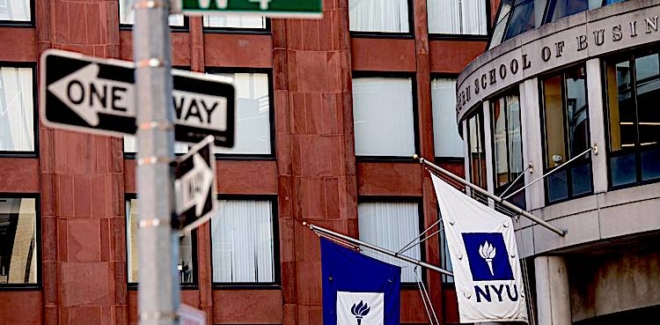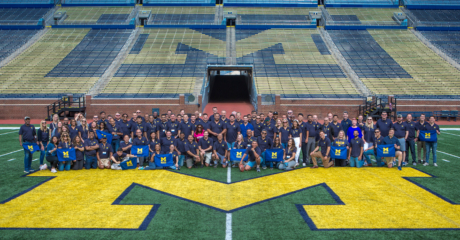“It’s executive first, MBA second.”
That’s how Robert Salomon describes New York University’s Executive MBA program. As the academic director of two EMBA programs at the Stern School of Business, what Salomon is referring to is the experience and wisdom EMBA students at Stern bring into the classroom.
“The seniority of our cohort is a distinction,” he says. “They average 14 to 15 years of work experience. They are on the cusp between the VP and the Senior VP level or they have founded their own companies and are looking to accelerate the growth of their companies. Sometimes EMBA programs are just a euphemism for part-time MBA programs. They are MBAs first, executives second.”
Of course, most EMBAs are older but the makeup of Stern’s executive students tend to be at the high end, even though Stern requires a minimum of just six years of work experience. At rival Columbia Business School, EMBAs average nine years of work experience, five to six years less. At Fordham’s Gabelli School of Business, it’s exactly 9.4 years, while the latest EMBA cohort at Baruch College’s Zicklin School of Business boasts a dozen years of experience.
Among the New York metro EMBA offerings, the Stern program will set you back $194,876. Cornell’s EMBA at its new Cornell Tech campus on Roosevelt Island in Manhattan is just a tad more pricey at $195,498, while Columbia’s program is nearly $14,000 more than Stern with a price tag of $208,680. Those prices are in the exact order of the rankings with Columbia first, Cornell second, and NYU Stern third in the New York market (see Ranking The Best Executive MBA Programs In New York Metro).
The experience Stern students bring with them is a key component of the EMBA experience. “With EMBA students you teach things in class that they were struggling with yesterday so they can go back and engage in meaningful conversations about what it means,” says Salomon. “The best part is when they have that ah-ha moment. They say, ‘Oh my god, I have been struggling with this for years and now I know how to do it.’”
At Stern, the average age of an incoming student is 38 and four out of ten of the students already have advanced degrees on their resume. It’s a diverse group, with 30% of the EMBAs having international backgrounds and another 30% composed of women. Salomon says the program has attracted students from Mexico, Nigeria and other foreign locales.
Stern’s flagship EMBA program in New York, launched in the 1980s, boasts two intakes a year with start dates every August and January. Each of those cohorts average about 60 students. And there’s also a new Washington, D.C., option for EMBA students, with a single class starting in the fall and taking in 50 students.
One admissions twist at Stern: You are not required to take a standardized test to apply and the school maintains that if you do apply without a GMAT or GRE you won’t be put at a disadvantage against applicants who did sit for a test. If you apply for the August start, the early deadline is March 1 with a final deadline of May 1. For the January start, the early deadline is Oct. 1 with a final of Nov. 1.
The New York program has a traditional alternating weekend format, with students meeting on Fridays and Saturdays from 8:30 a.m. until 4:30 p.m. If you live more than 40 miles away from Stern’s campus on West Fourth St., the school will foot the bill for a Friday night at Club Quarters, an executive hotel near campus. And if you live more than 80 miles away, Stern will provide complimentary accommodations for both Thursday and Friday nights.
Stern’s campus in New York’s Greenwich Village makes it an easy commute for Wall Streeters which may be one reason why so many finance types have gravitated to the program. In more recent years, however, the range of students has significantly broadened. “We have seen a diversification in the kinds of students who are attracted to our program,” confirms Salomon. “In the past, many were more finance oriented and now they are much more diverse in the industries they come from and in the industries, they want to go to afterward. We still have folks interested in finance but also things like consulting and areas like sustainability and tech.”
In the first year, students begin with the required core curriculum meant to provide a fundamental grounding in every business discipline. It begins with a weeklong domestic residency, which is held at a conference center in Westchester, New York. There’s an orientation day on Sunday after which students start their coursework and their study groups as cross-functional teams.
As part of the core first-year coursework, all students participate in a Global Study Tour, a weeklong international residency in several far-flung locales. These cultural immersions have been held in Latin America, the Middle East, and Asia and include meetings and in-depth discussions with leaders of industry, financial institutions and government organizations. Recent classes have trekked to Shanghai, Beijing, Mumbai, Argentina, Poland, the Czech Republic, Morocco, Spain, Germany, and Greece.
In the second year, students then choose a dozen elective courses, which help to customize the MBA program based on individual goals and interests. Students also have the option of taking a specialization or three from a portfolio of 13 options, including deep dives in such areas as supply chain management & global sourcing or management of technology & operations. Not surprisingly, the array of specializations include every aspect of finance from banking to corporate finance and financial instruments and markets. Each specialization requires the completion of at least nine credits. Also in the second year, students have the option of doing a second Global Study Tour to a different destination.
Throughout the experience, Stern tosses in a number of experiential learning projects, including one on the Global Study Tour. “There is a variety of them attached to different classes,” explains Salomon. “The bankruptcy class has a bankruptcy evaluation, while our course in sustainability has projects with companies that have relationships with our sustainability center.”
Recent graduates of Stern’s program say standout courses include Leadership In Organizations taught by Professor Anat Lechner and Crisis Management taught by Fred Garcia. Garcia wins raves for his teaching quality. “He had an engaging speaking style and brought to life amazing and controversial real-life situations that had a great impact on my way of viewing decision-making and leadership,” says Bryan Kelley, an MD who graduated from Stern’s EMBA program in 2019. “ He was able to clearly and articulately outline an organized strategy to deal with crisis situations that can be applied across all organizations and industries. As a result of his course, I have brought him in to meet with hospital leadership to help us develop a crisis management team at my place of work.”
Professor Aaron Tenenbein also wins praise from students for his course on statistics and data analysis. “Professor Tenenbein goes above-and-beyond to not only be knowledgeable and engaging but also to make sure his students understand why we are learning this content and how to apply it,” says Emily Yu, a 2019 graduate of Stern’s EMBA program. “Since regressions and standard deviations aren’t exactly high on my list of favorite things to spend time on, that’s saying a lot coming from me.”
With more prospective EMBA students also considering online options, Salomon is eager to emphasize the value of face-to-face education. “You can get a lot of a real classroom,” he says. “Just as valuable to them is not just the time they spend in class learning from the professor but the value to interact with their classmates in class and out over dinner or on projects. That is where the real magic happens. Meeting people who are at your level, struggling with the same things that are challenging you, there is a tremendous value in sharing those experiences with real people in the flesh.”
Salomon recalls one of his students who started her own cosmetics company. “She was a Ph.D. in a research group at a large cosmetic company,” he says. “She came with an idea for her own cosmetics line and developed it and refined the idea with her classmates to help make it better. They stress tested her ideas and pushed her and helped make her business model better, particularly on the business side because the science was there. And then she had a classmate was a vice president on the buying side at a luxury fashion retailer and the first one to pick up her cosmetics line was that company. That is the kind of stuff that happens face to face that you can’t get from an online program.”
When it comes to career outcomes, Stern boasts a Career Center for Working Professionals that has the usual mix of services, from one-on-one executive coaching to mock interview prep and access to job postings. As is typical in EMBA programs, access to the full-time MBA on-campus recruiting program is not allowed.
“In the old days, it was almost a conflict of interest to offer career services to EMBA students because on the one hand you had employers paying for them to go to school and then on the other you couldn’t say to those sponsors now we are going to help your employees leave you,” says Salomon. “More students are self-funded today and the world has changed. People move jobs a lot more than they used to. So now what we do is offer career services for life. Once they are part of the Stern family, they have access to career coaching, networking, seminars on how to pivot, how to advance, and how to transition. And that is available to the students for life.”









